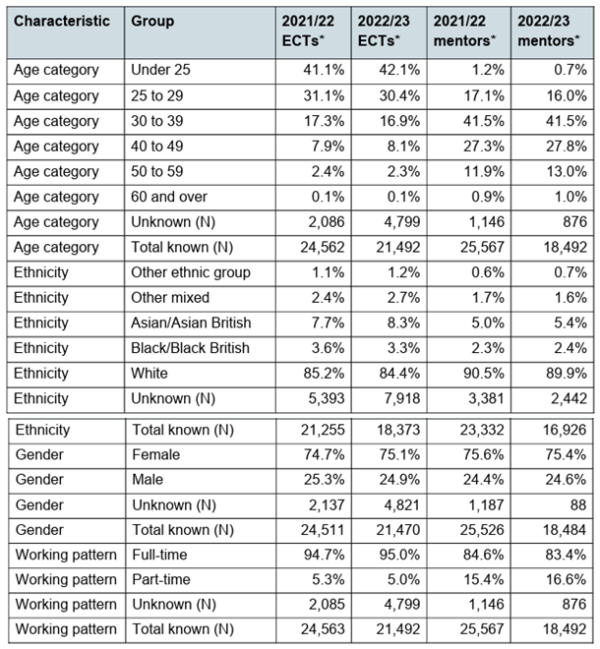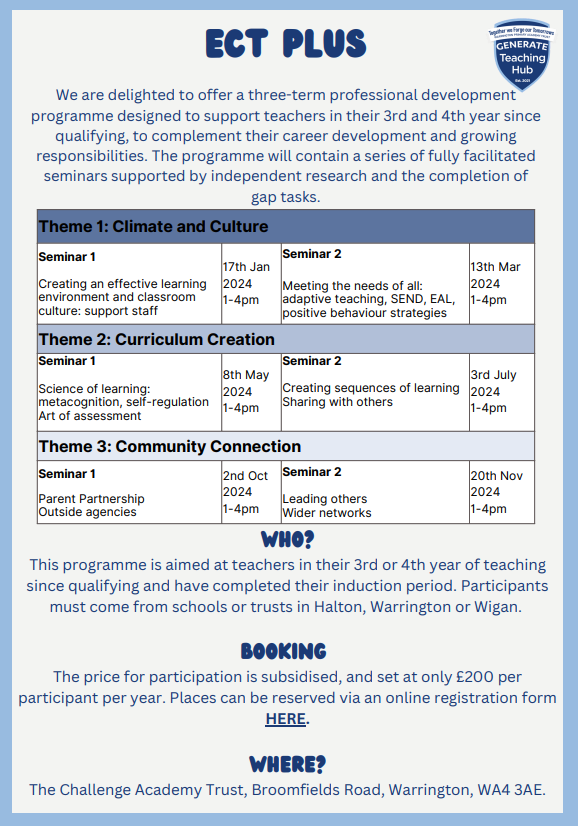ECF Year 2 Evaluation Report
The Department for Education has published a national evaluation of the Early Career Framework (ECF) covering year two (2022/23).
This follows on from an interim and full report published for year one (2021/22).
Read the full report here.
Programme Scale
The numbers of teachers engaged in the ECF programme has remained constant for ECTs but dropped for mentors:
-
Cohort 1 (2021/22) involved 26,648 ECTs and 26,173 mentors
-
Cohort 2 (2022/23) involved 26,291 ECTs and 19,368 mentors
95.7% of ECTs in cohort 1 and 96.1% in cohort 2 were enrolled on the full induction programme.
Insights
The evaluation report is extensive with much learning and insight to assess. Generate Teaching Hub has identified some key points that will be of interest to our school and trust leaders.
-
Induction tutors (79%) and mentors (77%) felt that extending teacher induction from one to two years has been beneficial to Early Career Teachers (ECT).
-
Within schools there is increasing complexity around coordinating and supporting the ECF programme, e.g. 71% of schools now have more than one mentor.
-
There has been some mentor turnover with teachers changing roles.
-
The understanding of the different support roles – induction tutors and mentors – is increasing. Most ECTs (92%) and mentors (80%) have contact with their local delivery partner.
-
There are still further requests for tailoring the content and depth of the ECF training curriculum, e.g. 23% of ECTs knew little or nothing of the year 2 content.
-
Some ECTs are still noting the repetition of the curriculum from initial teacher training.
-
As more mentor teachers are being trained the level of the average mentor’s teaching experience is reducing.
-
ECTs, mentors and induction tutors are requesting further support after the ECF programme.
Demographics
The average demographic of ECTs and mentors is white and female. ECTs are usually under 30 years of age and mentors in their 30s and 40s.
Mentors are usually highly experienced (14.5 years in teaching), full time and have a full teaching timetable.
Induction tutors are normally in senior leadership, have been teachers for 10 to 30 years and in their school for more than 5 years.

Programme Time
Average engagement time was measured over a 4 week period.
For ECTs they spend 12.25 hours on the programme (2.61 on training, 3.4 on self-directed learning, 3.03 on receiving formal support and 3.21 on informal support). This is significantly less than the average reported in year 1 of 17.07 hours.
Mentors spent 9.21 hours (3.16 on training and self-directed learning, 3.13 on providing formal support and 2.92 on informal support). This is less than the time reported in year 1 of 11.75 hours.
Increasing Confidence
The largest improvements in ECT confidence came in assessment, adaptive teaching practice, planning and promoting pupil progression. They generally retained a confidence in setting and demonstrating high expectations, planning and teaching well-structured lessons and managing behaviour. Responses around managing their own workload and well-being were lowest.
Read the full report below:
Evaluation of the national roll-out of the early career framework induction programmes
Next Steps
Generate Teaching Hub conduct a rolling programme of engagement and feedback for our delivery of the ECF. Our team will be reflecting on the national evaluation and identifying how it compares to our experience in Halton, Warrington and Wigan.
We have also launched a post ECF support programme for teachers in their third and fourth year since qualifying. This is being piloted during 2024 and 2025 to understand what the best local options are for our schools.

Our staff would welcome feedback from teachers and leaders on the Early Career Framework. We can also answer questions about its structure and local delivery. Please contact the team via hub@wpat.uk.
